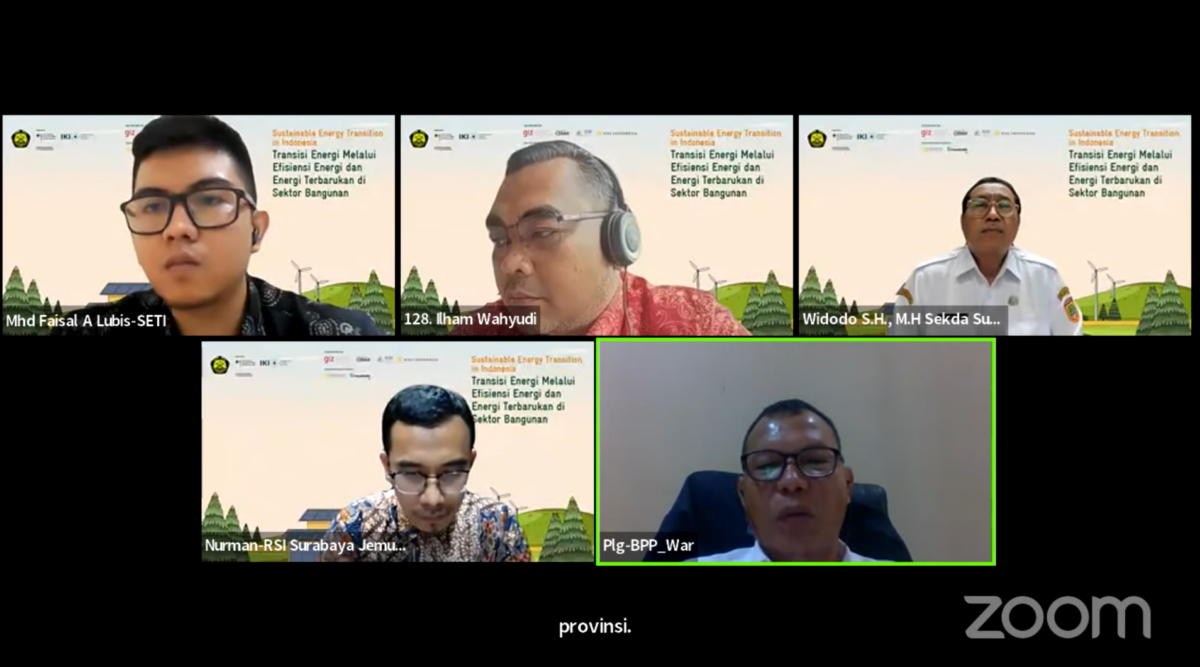Jakarta, October 30, 2024 – The energy transition is a gradual process with a long duration and requires collaborative efforts from various stakeholders ranging from the national government, sub-national governments, the private sector, and financial institutions to be able to share roles in realizing the energy transition.
The building sector is the sector that has large contributions toward energy consumption. Given that Indonesia is still dominated by fossil energy sources, the building sector also contributes high emissions.
Malindo Wardhana, Project Manager of the Sustainable Energy Transition in Indonesia (SETI), Institute for Essential Services Reform (IESR) in “Webinar Series 1: Energy Efficiency and Renewable Energy in the Building Sector”, explained that decarbonization of the building sector is important to be carried out by various stakeholders such as the national and sub-national governments.
“On this occasion, we provide a forum for city and subnational governments and the private sector to share their experiences in implementing energy efficiency,” he said.
Andriah Feby Misna, Director of Various New, Renewable Energy and Energy Conservation at the Ministry of Energy and Mineral Resources, said that energy efficiency is a strategic practice (low-hanging fruits) to reduce emissions from the energy sector.
“Energy efficiency and the use of renewable energy are priority strategies for achieving Indonesia’s Net Zero Emission (NZE) target in 2060 or sooner,” said Feby.
Praptono Adhi, Coordinator of Investment and Cooperation at the Ministry of Energy and Mineral Resources, added that the use of renewable energy will reduce the amount of emissions produced. Indonesia also has a huge number of technical potentials for renewable energy.
“The use of renewable energy in Indonesia is currently still very small, only around 0.3 percent of the total technical potential owned. Therefore, we will continue to encourage the use of renewable energy such as solar, hydro, and wind,” he said.
According to him, energy managers in buildings are a necessity, especially if the building’s energy consumption consumes a large amount of energy. High energy consumption is expected to correlate positively with productivity.
In addition, extraordinary awareness of the application of energy efficiency and conservation is beneficial for reducing electricity costs. This was stated by Widodo, Regional Secretary of Sukoharjo Regency, Central Java. He shared his experience in managing energy in the Menara Wijaya Sukoharjo, Integrated Office Building. According to him, to mainstream the energy efficiency campaign, efforts are needed to build awareness about the importance of saving energy and other resources such as water.
“We see electricity costs continue to rise from time to time, so energy management is a must,” said Widodo.
About SETI
Sustainable Energy Transition in Indonesia (SETI) is a collaborative project between the German and Indonesian governments through funding from BMWK (German Federal Ministry for Economic Affairs and Climate Action). The SETI project is carried out by a consortium consisting of GIZ, IESR, WRI, and the Indonesia CERAH Foundation. In addition, there are implementers consisting of Fraunhofer ISI, LPEM UI. The political partner of this project is the Ministry of Energy and Mineral Resources (ESDM), specifically at the Directorate General of New, Renewable Energy & Energy Conservation.

